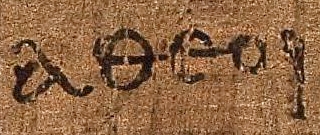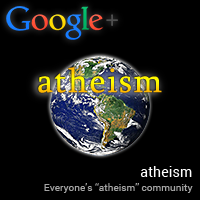
The words "atheism" and "atheist" originated from the Ancient Greek word "ἄθεος"4 ("átheos") meaning "without deities"21 without any direct or implied anti-theistic (or anti-religious) connotation31, for it was (and still is) impartial in its initially intended use -- philosophical atheist thought is also believed by some scholars to have begun in Asia and Europe as early as 600 BCE.
Although "atheism" is sometimes assumed to be derived from the word "theism," it actually predates12 it. Originally the concept of "atheism" was contributed by the Greeks in 5th Century BCE, followed by the words "atheist" and "atheism" making their way into Latin in 1501 CE, and later introduced to English in 1553 CE (according to one timeline) or the mid-to-late 1580s CE (after being adapted from the French words "athée" and "athéisme") which, interestingly, was almost one century before the words "theist" and "theism" were added to the English language in the 1660s and 1670s CE.
Historically, the derivations from both the Latin and French languages have the same notable distinctions of further emphasizing the "not believing" and "believing" characteristics (as what is emphasized as psychological) upon being translated to "athéisme" ("atheism") and "théisme" ("theism"), which in turn also carried forward to the later English translations to "atheism" and "theism" respectively (and continue to exhibit these qualities to this day).
Conflation between the "a-"34 prefix and the "anti-" prefix does sometimes occur, but according to the etymology they specifically mean different things. For instance, the alpha-privative prefix "a-" or "an-" is still used in Greek words to express negation or absence, while the "anti-" prefix partly yet also distinctly in contrast and more actively expresses opposition. The following point-form listing is provided as a convenience to reaffirm the meanings of these commonly-used prefixes, and also include a number of helpful usage examples to demonstrate how these particular words are constructed:
- prefix "a-" means "without" (or "not"), and is a generally passive alpha-privative that originates from the Greek language to express negation or absence:
- agnostic = a-gnostic = not gnostic
- amoral = a-moral = without morals
- anarchy = an-archy = without a system of government ("an-" is synonymous with "a-")
- apolitical = a-political = not political
- asynchronous = a-synchronous = not necessarily occurring at the same time
- atheism = a-theism = not theism (e.g., not believing in any deities)
- prefix "anti-" means "against" (or opposed/opposite), and is generally active:
- antiauthoritarianism = anti-authoritarianism = against authoritarianism
- counterclockwise = counter-clockwise = opposite direction to the clockwise direction ("counter-" is synonymous with "anti-")
- antimatter = anti-matter = opposite of matter (which is not the same as an absence of matter; note that anti-matter is matter composed of anti-particles that correspond to ordinary matter)
- antimicrobial = anti-microbial = against micro-organisms (typically in a destructive sense)
- antitheism = anti-theism = opposite of theism (e.g., believing that there are no deities) or opposing theism (e.g., against theism)
- antithesis = anti-thesis = the direct opposite of something
Antonyms
Although "atheism" and "theism" can be regarded as opposites, this requires misusing the word "theism" in a non-standard way that's categorically-passive (this colloquialism is still known to persist in some limited social circles, and unfortunately seems to survive mostly due to a few infamously erroneous dictionary definitions).
Pairing "anti-theism" antonymically with "theism" is more accurate because these two words represent positions that are both actively-held and diametrically-opposed with reasonable consistency.
For additional perspective, consider that walking forward and walking backward are diametrically-opposed activities. The inaction of "not walking" is, however, not diametrically-opposed to walking forward or backward specifically, although it can serve as the passive opposite of walking in all directions. In summary, atheism compares in the same way to the actively-held positions of theism and anti-theism (as well as deism, pantheism, etc.).
Deviations
An extended usage was applied just prior to c. 500 BCE to characterize "atheism" as a position that specifically opposed the existence of deities (a.k.a., "anti-theism"). This was most likely due to its popularized use in debates about religion, such as between Chrestos (e.g., Pagan followers of Mithras, Helios, and Osirus who were called "Christians" before 33 CE) or Christians (after 33 CE), and Hellenic Polytheists, where some adversaries accused each other of being atheists as if it was something unacceptable (perhaps in the absence of other more suitable vocabulary like "anti-theist," hence atheism may have been used as a generalized stand-in amidst a less evolved language from ancient times).
Roughly 2,000 years later, during the 1570s and 1580s, the word "athéisme" was introduced to the French language. Shortly after that time, the word "atheism" became a part of the English language over the next 5 to 15 years, and long before "theism" was added to the vocabulary (which disagrees with the seemingly-logical assumption that the word "atheism" is dependent on the word "theism").
Throughout the 1700s and 1800s when Christianity was enjoying tremendous popularity despite the increasing prominence of philosophy and science, the word "atheism" was more commonly used as an ad hominem attack (e.g., in a debate), informally as an insult, etc. It may be argued that the origins of this disdainful attitude toward atheists originated from The Holy Bible's advocacy for the killing of infidels (see 2 Chronicles, chapter 15, verse 13).

Returning to our roots
In the 1900s people gradually began to identify themselves as "atheists" to more clearly and accurately indicate that they were "non-believers" in deities. As the onset of an increasingly literate and better-educated populace permeated in tandem with the advancements and growth of modern civilization (in part due to the Gutenberg Press), the wider acceptance of the distinction between "atheism" and "anti-theism" resulted.
Since conflict due to much variation of these two words ("atheism" and "atheist") still persists between dictionaries, glossaries, and encyclopedias, it's reasonable, for the sake of accuracy, to therefore consider the origins and etymology of the words in question. In the case of "atheism"13 and "atheist,"14 it appears that the meanings began to deviate from a naturally impartial classification to an anti-theistic position, but now that the meaning of the word "anti-theism" is so widely understood this deviation can more conveniently be rectified...
Linguistic recovery
The words "atheism" and "atheist" presently appear to be on course for a full recovery, albeit slowly because it can often be difficult to "see the forest for the trees" whilst in the throes of the gradual evolution of anything, and language is no exception. With the advent of the internet, access to information, along with the profound freedom to publish literally any ideas, has lead to more meaningful - albeit uncomfortable at times - forms of truly open and honest discourse that serve incidentally as the driving pinnacles of progress.
Further reading
![[D.A. logo]](/images/logo-da-small.png)
![[Chinese word for: atheism -- Wu Shen Lun)]](/images/chinese-word-for-atheism.png)



